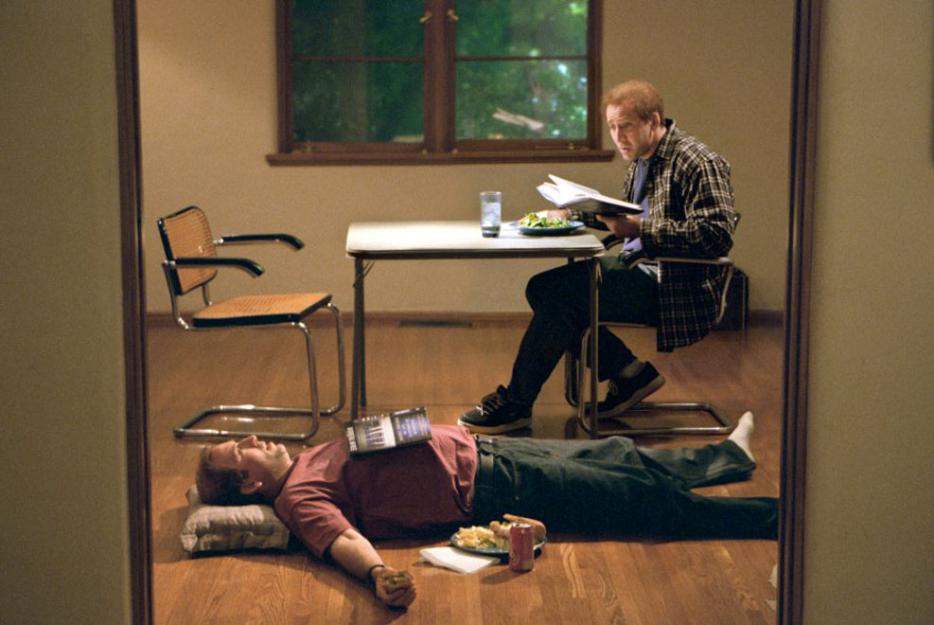Last winter, I saw A Separation at the Film Forum here in New York. The film is complicated, moving, and—according to the guy who sat in front of me—represents “a perfect screenplay.”
“Just look at how each scene takes our expectations, and subverts them,” he told his impossibly bored looking date. “And the third act is great. You can see how all the parts build to a resolution.”
I’ve heard plenty of young men (and they are always men) talk like this, loudly and publicly. They explain to indulgent friends and unwilling eavesdroppers how a particular movie succeeds in “raising the stakes,” what “image systems” were employed, or how well the Objects Of Desire (or “OODs”) were used by the screenwriter. For a while, I had no idea what the hell these guys were going on about. I loved A Separation. I love lots of movies. And my love for them has almost nothing to do with how well the writer used her OODs.
These young men belong to a group I call the Cult of McKee, a group of true believers who filter their movie-going experiences through the maxims of Robert McKee and other screenwriting gurus who claim to have unlocked the secrets of storytelling. While there are whole sections of bookstores dedicated to screenwriting advice, McKee is the only name-brand script teacher with mass appeal. His tome, Story, and his mysterious travelling three-day seminar, have made him the avatar for his profession. On stage and in print, McKee presents himself as a profane and unsentimental truth teller who preaches the tenets of Story (always with a capital S) as though they were gospel: always let your characters grow, never use voiceover, adapt your work to classic storytelling forms but always be vigorously original.
McKee has made his reputation in part from the success of his students—Pixar is known to send a handful employees every time he lectures in San Francisco, and he’s often cited as an influence on heavy hitters like Peter Jackson, who saw McKee lecture before writing the Lord of the Rings trilogy. It’s easy to read a great deal of popular culture through McKee’s lens. Movies as disparate as Avatar, The Lion King, and Sideways have similar DNA: there’s a hero, he has something he wants, he has to go somewhere unusual to get it, he grows and learns on the journey, and he eventually returns home, fundamentally changed. He gets what he wants, as well as something bigger—he becomes brave, or confident, or realizes the importance of family. In unusual cases, he kills himself, or goes crazy.
We live in a new kind of auteurist age, one where working in film and TV is still considered a glamorous job for humanities grads the world over, but where directing is no longer seen as the brass ring. To the new generation of smart young filmmakers, the model creator is someone who wrote their own thing, be it Louis CK, Lena Dunham, Dan Harmon, Matthew Weiner, or PT Anderson. Thanks in part to the rise of independent film and original shows on premium cable—where the author is often the public face of the project—screenwriting has become a vaunted profession. And as screenwriting continues to grow in appeal, so does the value of an informed mentor like McKee.
*
It’s hardly a new point, but Robert McKee’s influence has extended well beyond film culture. As playwright Mark Ravenhill noted a few years ago in The Guardian, his maxims are now consulted by theatre creators and leaned on by editors to give their critiques authority. In public radio, ideas like “stakes” and character arcs are used to help structure the long-form pieces we hear on shows like This American Life and Radiolab. Outside of the media world, McKee frequently lectures to business people, helping executives format their public selves. He has been a part of the revolution in corporate communications where narrative trumps statistics.
Despite the ubiquity of McKee’s ideas, there is an intellectual backlash from artists and thinkers who find them limiting. Ravenhill said that McKee teaches a Fordist production model of art, one that encourages a sameness through which “gradually, our culture is turning into the equivalent of the McFlurry.” The Charlie Kaufman film Adaptation is a long missive on one screenwriter’s struggle to transcend the storytelling straightjacket that McKee imposes. “I don’t want the characters to learn profound life lessons,” says Kaufman’s surrogate in the film. “That’s not how life works.”
I feel like I’ve been conditioned to look down on McKee, to see him as the guru of screenwriting-by-numbers. This perception is born in part from the many lesser guides that actually lay out plot types, with prescribed turns and arcs. (The most baldly crass version of this can be found in Writing Screenplays for Profit, a winking but entirely functionalist how-to written by Tom Lennon and Ben Garant, in which the authors lay out the specific page number by which certain character events must take place.) But this is a caricature that obscures McKee’s best points—as I learned this fall, when I finally decided to read Story.
After the three-week library wait list cleared, I was surprised to find that McKee stresses form over formula. He insists that your work be slavish to the architecture of Homer or Aristotle, but at the same time full of fresh ideas and characters. He recommends taking the messiness of lived experience and confining it within the archetype of a “hero’s journey.” This is not to say that all movies should be the exact same thing—it’s more of a call to ingenuity through the creative catalyst of limitations. There have to be stakes, and characters have to change, and above all there has to be trouble, some kind of conflict that forces the “hero” to make tough choices. But the hidden spine of McKee’s philosophy is the idea that writing has to be psychologically familiar. He says that the movies can’t be empty spectacle, but instead must serve the audience: they allow us to confront the emotions we don’t want to experience in real life. Bad things need to happen in screenplays so we can see how the characters react, and feel some kind of empathy with their struggles.
While the idea that every story needs this kind of arc is a topic for debate, new science suggests that McKee’s reasoning actually has a biological imperative. Jonathan Gottschall’s book The Storytelling Animal aggregates a lot of recent science and suggests McKee’s ideas are supported by no less an authority than evolutionary biology. In the chapter “Hell is Story Friendly,” Gottschall examines how children’s games and human patterns of dreaming are not “escapist” but rather full of trouble and trauma. “There is a yawning canyon between what is desirable in life,” he writes, “and what is desirable in fiction. In this gap, I believe, lies an important clue to the evolutionary riddle of fiction.” He goes on to look at a few neuroscience experiments that explored the effect of fiction on the brain. One team at Stanford found, through fMRI scans, that a viewer’s brain will actually “catch” the emotion being portrayed in a movie. Our brains “appear” sad during emotional moments. Our anterior insula, the “disgust center,” which is triggered by bad smells, lights up when a character is enduring something unseemly.
Gottschall posits that fiction has an evolutionary function, preparing our brains for life, essentially readying us for difficult moral tasks through a simulacrum—our brains experience stories as though they are real so that we know how to handle actual dilemmas when they arise. Steven Pinker makes a similar point in his book about human nature, suggesting that realistic fiction can expand human empathy. We need trouble in our fiction, and we need a clean resolution to relieve our brain from the pain we’ve just put it through.
The idea that humans need stories is as intuitive as it is obvious—we don’t need a good neurologist to tell us the human animal craves narrative and structure to organize the chaos of real life. We need story—but do we need Story, with a capital S? Perhaps not, but it helps to have a template, some time-tested guidelines to help the teller connect with her audience. For every Paul Thomas Anderson or Thomas Pynchon, path-breaking talents who master form and know how to work around it, there are many, many more writers who are keenly observant and fluent with language, but need a sturdy and flexible skeleton for the blood and flesh of their words. And then there are hacks like me, who have no sense of where to start at all.
The risk, of course, is that hacks like me will read McKee poorly. Big budget movies today certainly have character arcs and stakes and turns, but they’re often executed sloppily. Earlier this year, McKee himself lamented to the BBC that the Hollywood film was dying, citing the Pirates of the Caribbean movies as examples of how films with leaden, overly convoluted plotting have become the norm in our culture (David Denby calls this syndrome the curse of “conglomerate aesthetics”). It’s as though we’ve decided that every movie should be like eating an entire narrative cake rather than an apportioned slice. For every Argo—by all rights, a competent movie with a compelling story—there are five Madagascar movies, or Amazing Spider-mans.
It’s tempting to read McKee as a tragic figure, at least based on his own self-presentation: while he praises form, many critics cast him as the man who made film writing formulaic. However, he is probably taking solace in this: McKee’s emphasis on storytelling has found traction beyond Hollywood, in the long-form narratives flourishing on television, in independent film, on the radio, and in still unformed mediums, where companies like The Atavist are trying to forge something new. For good and bad, we will always need our stories. They might as well be good.





